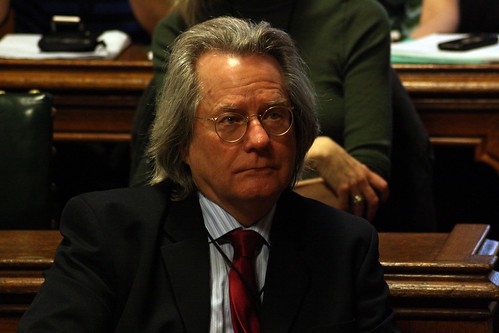Sydney Poetry
A social site for poets in Sydney.
Sydney Writers' Festival: Report from Thursday
Image: AC Grayling (above) spoke on the Thursday May 19th session 'The Poetry of War' at the Sydney Writers Festival.
Ed: Jonathan Shaw has cross posted several session reports from his blog Me Fail? I Fly!. This is the first. See also his notes on the Francis Webb session and Poems on Pillows.
After I uploaded my sketchy report on last night's SWF event at the Town Hall I searched for #swf2011 on Twitter and saw that everything I'd quoted had been tweeted to the universe within seconds of being uttered. Undaunted, here I am again, lumbering along with my antiquated longwindedness to bring you My Thursday at the Festival Part One: 10 till 2.
10 am: The Poetry of War with Daniel Swift and A C Grayling (pictured above)
Daniel Swift's grandfather flew in planes that dropped bombs on German cities in World War Two. He failed to return from a bombing mission in 1943 when Daniel's father was four years old. The book, Bomber County, tells of Daniel and his father visiting the grave. Daniel, by my calculations now 34, wanted this small story to open out into a bigger picture. He sought out and interviewed participants in bombing missions, and people who were in the cities bombed by his grandfather on the nights of his missions All this, plus an exploration of World War Two poetry, which anyone (else) will tell you barely exists, fed into a project of considering the bombing campaign, not to praise the heroism of the men or condemn or defend the atrocity involved, but to try to imagine - resurrect was Swift's word - the human experience.
A C Grayling , when he's not busy being the nice one of the current crop of aggressive British atheists, is an ethicist. His book, Among the Dead Cities, deals with the ethics of those same missions. The focus of this session was on Swift's book, which Grayling clearly loves. They claimed to disagree on the ethical question, but I couldn't spot any disagreement. The conversation was lovely in many ways, not least for the spectacle of an eminent professor putting his considerable intellectual heft into recommending the work of a much younger man. The air fairly crackled with respect - mutual between the speakers, from both of them to the men who flew on the mission, and during question time to the rambler and the autobiographer.
11.30 am: Antipodes: Poetic Responses
Antipodes is an anthology, edited by Margaret Bradstock, of Aboriginal and non-Aboriginal poets addressing the relationship between Aboriginal Australians and settlers – the survivors of genocide in conversation with the perpetrators, descendants and beneficiaries, as it were. The facilitator, Martin Langford, said it was the first book of its kind, and warned us that some of the sentiments, especially in the early settler poems, might be repugnant to modern readers – the book is meant to be read as whole. In order of appearance we were read to by:
Anna Kerdijk Nicholson, who read a number of poems from Possession. It was good to hear them read, though my impression was that the poet was intimidated by the context. I wouldn't have objected if she'd explained the universally cryptic titles of her poems, but she just read and then sat down.
Lionel Fogarty: again I was very glad to hear him read, as I have a copy of his New and selected poems : munaldjali, mutuerjaraera but haven't been able to read very much of it. Now that I've seen and heard him I may have a better chance. He read a semi-rap, 'True Blue, Didjeridoo', which he and his son wrote when Nicole Kidman was culturally insensitive enough to play a didjeridoo on television.
I don't know the work of either Margaret Bradstock or Brenda Saunders. They both read well, but I have trouble absorbing non-narrative poetry that I'm hearing for the first time. Ali Cobby Eckermann, a little of whose work I've read in anthologies and journals, read us excerpts from an unpublished verse novel, Killing Fields, a massacre story. 'You're privileged,' she said.
Anita Heiss read last. With her brilliant control of tone she had us laughing and devastated from moment to moment. A woman of many talents, she thanked the organiserd for calling the writing in her book I'm Not racist, But poetry. 'It's not really poetry,' she said, 'but it's not prose because it doesn't go to the end of the line.'
I'm not sure what this anthology is. It may be intended for schools. Not that there's anything wrong with that of course, but it does make me hesitate to rush out and buy it for myself.
1 pm: The Poetry of Three
This was Mark Tredinnick, Kim Cheng Boey and Cate Kennedy. Mark is a nature writer, and the poems that worked best in this context dealt with the nature of a parent-child relationship. I particularly liked 'House of Thieves'. Kim Cheng, whose work I know only from his readings last year, was again delightfully urbane. Cate's poems are narratives, and went over like a charm. I plan to buy her book.
Probably the strongest visual image from the Festival is the huge queues, all of which today seemed to have Bob Ellis in them. The queues for poetry were all short, and at each poetry session one of the readers expressed gratitude and surprise that so many people turned up.
Reposted from Me Fail? I Fly!
On Facebook
@sydneypoetry
© 2024 Created by Adrian Wiggins.
Powered by
![]()

You need to be a member of Sydney Poetry to add comments!
Join Sydney Poetry